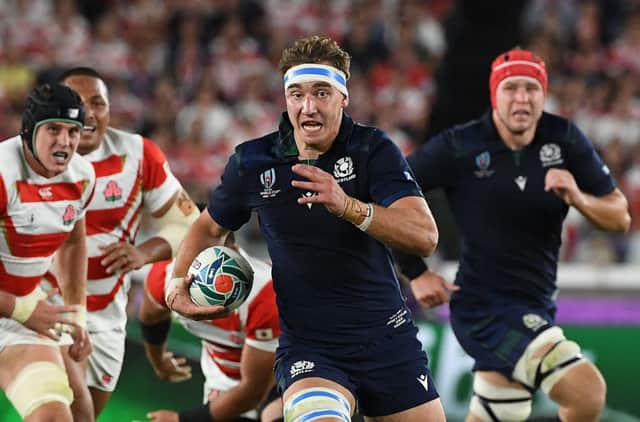Allan Massie: Not a memorable year but young Scots talent point to bright future


There have been occasional very welcome victories, notably in Calcutta Cup matches and against Australia and South Africa. If we have rarely lost matches we were expected to win, victories in games we were expected to lose have also been rare. Meanwhile, Edinburgh and Glasgow perform respectably while evidently struggling to keep pace with Leinster, Munster and, recently, Ulster.
We went to the World Cup with a sense of optimism tempered by an awareness that warm-up matches had been less than wholly convincing and the daunting knowledge that if we came first or second in the pool, we would run up against either New Zealand or South Africa in the quarter-final. Nobody realistically expected us to get further than that, but, sadly, we didn’t get that far.
Advertisement
Hide AdAdvertisement
Hide AdIn our opening match against Ireland we were inexplicably poor. I say “inexplicably” because neither players nor coaches have been able to account for the dismal performance. Then came the typhoon and uncertainty as to whether our last pool game against Japan would even be played. If the SRU’s chief executive scarcely distinguished himself in the days of uncertainty, one has to say that World Rugby’s preparation for what was, given the time of year, quite foreseeable, left, to put it with an unaccustomed degree of mildness, much to be desired.
The match itself redeemed a lot, even if we lost, for it was arguably the best game of the cup. Even so, it was one we let slip, especially in view of the fact that we took an early lead with Finn Russell’s try, only for the rest of the first half to be dominated by Japan playing beautiful and imaginative rugby. We came back well in the second half, but not quite well enough, and a post-mortem examination showed that two of Japan’s four tries stemmed from defensive mistakes.
So, looking back over the international year, one was really left only with that extraordinary second half at Twickenham to warm the memory, and even that was soured first by an awareness of how awful we had been for the first half-hour of the match, and, second, by irritation that we had enabled England to snatch a draw by foolishly conceding an utterly unnecessary penalty after the 80-minute mark. Yet, even though we are a nation for whom the glass is more often than not half-empty, nobody can continue to follow Scottish rugby without being ready to look on the bright, or at least, brighter side. A number of young players have come through, playing well enough to be encouraging. Scott Cummings has made huge strides this year, and looks capable of becoming the sort of abrasive hard-carrying lock that we need. The Edinburgh flankers Jamie Ritchie and Magnus Bradbury have done more than make their presence felt, and Ritchie was arguably the outstanding Scottish player in Japan. Darcy Graham, pictured inset, has been a delight on the wing, and, now that Tommy Seymour has retired from international rugby, may keep possession of the No 14 jersey as securely and for as long as Shane Williams did with the Welsh No 11 shirt. Zander Fagerson is developing into a truly formidable tight-head and his young brother Matt is coming on fast. The same may be said of George Horne, though I reckon that for the big matches he is still behind Ali Price. Meanwhile, even English journalists have realised that Finn Russell has something that no other stand-off in the Lions countries comes close to having.
Finally the news that Greig Laidlaw was saying good-bye to international rugby came a couple of weeks after I had written about Seymour and John Barclay doing just that. Laidlaw has always had his critics, but to my mind he rates pretty high in the distinguished line of Scottish scrum-halves, certainly as high as anyone for his reading and management of a game. We will miss his intelligence and also, Lord help us, his goal-kicking. No doubt about that.
As a goal-kicker he ranks with Chris Paterson as one of the best we have ever had, and, as with Paterson, our record would have been even more depressing than many find it but for his ability to keep the scoreboard moving in our favour.